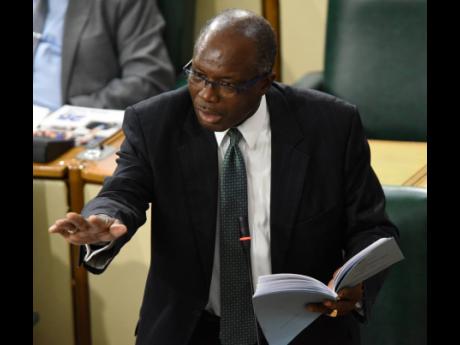RETROGRADE STEP
Critics say Warmington’s pitch to reform IC problematic, smacks of political interference
Human rights group Jamaicans For Justice (JFJ) and National Integrity Action (NIA) are urging Jamaicans to reject a proposal by government minister Everald Warmington to, among other things, remove the prosecutorial powers of the Greg Christie-led...
Human rights group Jamaicans For Justice (JFJ) and National Integrity Action (NIA) are urging Jamaicans to reject a proposal by government minister Everald Warmington to, among other things, remove the prosecutorial powers of the Greg Christie-led Integrity Commission.
Warmington’s proposal follows the tabling of an unfavourable Integrity Commission report that involved Prime Minister Andrew Holness in February.
The manner in which the report was released drew public scrutiny and condemnation of the commission in some quarters.
In a Gleaner interview yesterday, Executive Director of JFJ Mickel Jackson urge lawmakers to be cautious in how they react to the findings of any statutory agency or commission of Parliament that is intended to keep them and other public officials accountable.
Jackson said that JFJ is concerned that Warmington’s recommendations, which appear to have bipartisan support, “are sending a signal of political interference” that exists to weaken the power of the commission.
“We find this posture of the Joint Select Committee and parliamentarians very problematic,” Jackson said.
“When you look at a country where our history politically and socially has been stained by acts of corruption and corruption-related matters, we believe that the recommendations largely being proffered by Minister Warmington ought to be rejected by the Jamaican people,” Jackson asserted.
WARMINGTON’S PROPOSAL
The charge comes a day after Warmington, who said he was putting forward the proposal in his capacity as a member of Parliament, told the Joint Select Committee reviewing the Integrity Commission Act 2017, which he is a member of, that prosecutorial powers are constitutionally vested in the director of public prosecutions.
He also wants Section 1(a) of the Integrity Commission Act appointing the auditor general to the body to be deleted and replaced as Parliament deems appropriate.
Warmington also wants the law to be amended to allow for the statutory declarations of members of the commission and its staff to be gazetted and for the powers of the Integrity Commission to request information on statutory declarations pre-dating the promulgation of the law in 2017 to be revoked.
“The functionality of the Integrity Commission will be automatically weakened, and this is very problematic again. We have to look at the safeguarding of (its) procedures and protection that the Integrity Commission currently enjoys given the nature of its work,” she said.
She said on the matter of prosecutorial powers, the director of corruption prosecution is independent within the context of the Integrity Commission.
Jackson said that the Integrity Commission was among several bodies recommended to be entrenched in the Constitution to secure its independence and safeguard against any erosion of its power “as is currently being contemplated”.
She said lawmakers should not be able to, by simple majority, pass laws that would weaken the powers of the Integrity Commission.
“What we are saying to parliamentarians is, ‘Do better. Send a stronger signal to the country that they are serious about corruption. Remove the gag clause. Ensure that the proposals around the impeachment of public officials are revisited. Pass a broader anti-corruption law in the country’.
“These are the critical things that parliamentarians ought to be focusing on rather than taking a retrograde step,” she said.
Jackson said that the actions of the Joint Select Committee appear to be a “clear witch hunt” since a meeting of the Integrity Commission Oversight Committee was not convened to discuss the recent actions of the commission and have its concerns responded to.
She added that Warmington’s proposal was an attempt to “undermine” the Integrity Commission and the public’s trust in the entity.
Principal Director of National Integrity Action Professor Trevor Munroe, meanwhile, has said that Warmington’s proposals amount to curtailing the power and the independence of the Integrity Commission.
He said were these proposals to be accepted, it would set back the country’s efforts to combat corruption by at least 20 years.
“…What Member Warmington is proposing is an introduction of a law where only the members of the Integrity Commission would be subject to impeachment. This is completely unacceptable,” Munroe stated.
“In fact, there is now a bill before Parliament for impeachment provisions to apply to members of the House and members of the Senate,” he added. “Member Warmington should take out that bill and support it and bring it forward rather than seek to target this relatively independent commission which is charged with the responsibility of combating organised crime and corruption.”

